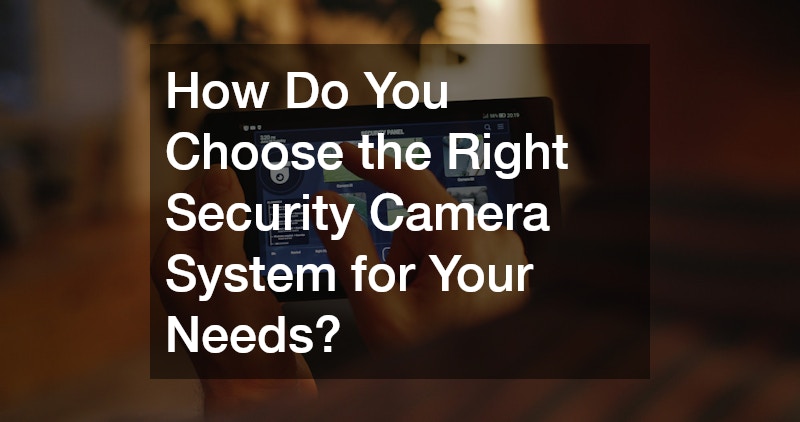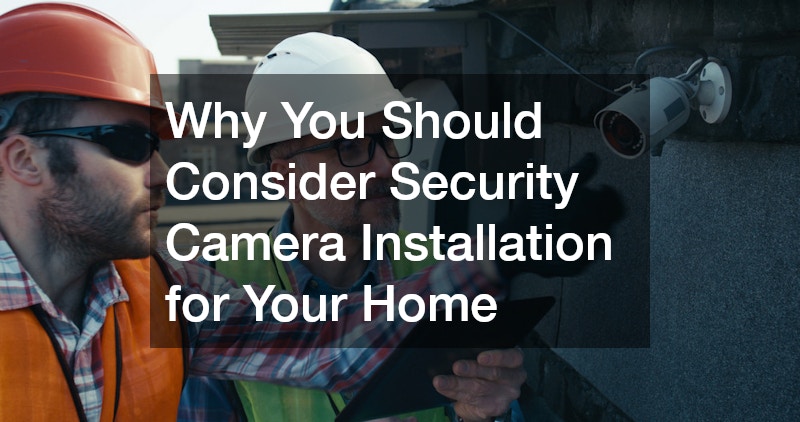Home security has become increasingly important in today’s world. With the rise in property crime and the growing desire for peace of mind, many homeowners are actively exploring practical ways to protect their homes and loved ones. One of the most effective methods is security camera installation. Advances in technology have made cameras more accessible, easier to install and increasingly effective in monitoring properties, allowing homeowners to safeguard their families, belongings and overall property with greater confidence and assurance.
How Do Security Cameras Enhance Home Safety?
Security cameras serve multiple functions beyond simply recording activity. Their presence alone can discourage potential intruders, as homes with cameras are often seen as higher-risk targets.
Modern systems also offer real-time monitoring, allowing homeowners to check live footage from their devices. Additionally, recorded footage can provide valuable evidence in case of theft or property damage, improving the overall safety of the household.
Deterrence of Crime and Intrusions
Visible cameras act as a strong deterrent for criminals. When potential intruders see a home equipped with security cameras, they are less likely to attempt a break-in. Research shows that homes with visible surveillance systems are far less likely to experience burglaries. This preventative aspect is one of the key benefits of security camera installation, as it not only protects property but also reduces the likelihood of harm to residents.
Remote Monitoring Capabilities
Modern security cameras are no longer confined to a single location. Homeowners can monitor their property remotely through smartphones, tablets or computers. Remote access allows you to check who is at the door, view live feeds of outdoor areas and receive instant alerts if unusual activity is detected. This feature provides peace of mind, especially when you are away from home for work or travel.
What Types of Security Cameras Are Best Suited for Homes?
There is a wide variety of security cameras available, each designed to meet different needs. The main distinctions include indoor versus outdoor cameras, wired versus wireless systems and smart cameras with advanced features. Understanding these differences helps homeowners select the best system for their environment and security requirements.
Indoor vs. Outdoor Cameras
Indoor cameras are generally smaller and more discreet, suitable for monitoring entry points or high-value areas within the home. Outdoor cameras are typically more robust, weather-resistant and often include features like night vision and motion detection. For comprehensive protection, a combination of indoor and outdoor cameras is usually the most effective approach.
Wired vs. Wireless Systems
Wired systems tend to offer more stable connections and are less susceptible to interference, making them reliable for continuous monitoring. However, installation can be more complex and may require professional assistance. Wireless systems offer easier installation and flexibility, allowing cameras to be placed in a wider range of locations. Homeowners should weigh the pros and cons of each system based on their property and technical comfort level.
What Are the Costs Involved in Security Camera Installation?
Understanding the costs associated with security camera installation is crucial for budgeting. Expenses can vary widely depending on the number of cameras, the system’s sophistication and whether professional installation is required.
Upfront Purchase and Installation Costs
The initial costs typically include the purchase of cameras, any necessary hardware and installation fees. High-end cameras with advanced features such as facial recognition or AI motion detection may come at a premium. DIY installations can reduce costs but require some technical skill.
Maintenance and Subscription Services
Ongoing costs should also be considered. Some systems require regular maintenance, while others may charge subscription fees for cloud storage or advanced monitoring services. Evaluating these costs upfront helps homeowners make informed decisions and avoid unexpected expenses.
How Do You Choose the Right Security Camera System for Your Needs?
Selecting the right system depends on assessing your security needs, available budget and preferred features.
Assessing Your Security Needs
Start by evaluating your property’s vulnerabilities. Identify entry points, blind spots and areas where valuables are stored. This assessment will guide decisions about camera placement, quantity and type.
Comparing Features and Brands
Researching different brands and systems ensures you select a reliable and effective solution. Look for features such as night vision, motion alerts, remote access and video quality. Comparing multiple options helps you find a system that balances cost, functionality and ease of use.
Investing in security camera installation offers tangible benefits, from deterring crime to enabling remote monitoring and providing valuable evidence if incidents occur. By carefully considering your home’s specific needs, selecting suitable cameras and understanding the associated costs and ongoing maintenance, you can significantly enhance the security of your property and enjoy greater peace of mind. Taking proactive, well-planned steps to protect your home is not only practical but also a smart and effective way to safeguard your family and possessions.

